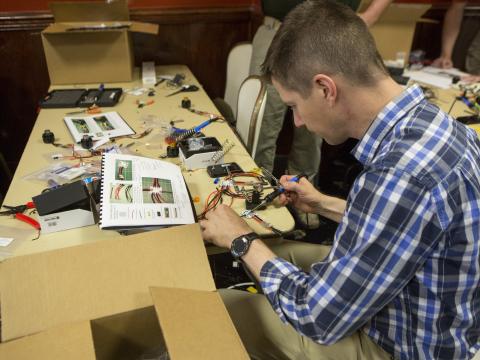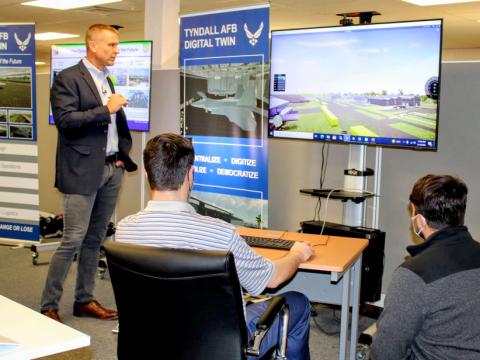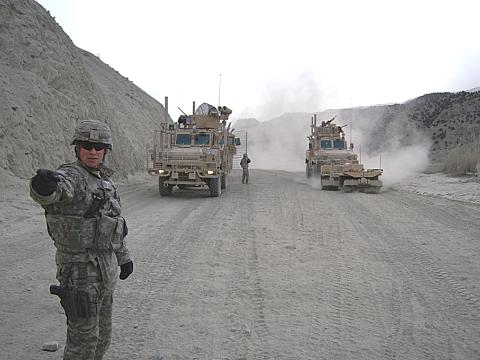Federal Information Technology Company Plans Continued Growth Streak
Chairman envisions the market remaining robust, predicts more mergers.
If throughout your entire professional life you had gone by a nickname associated with one of the towering giants of American literature, what would you do when you finally retired from the corporate world?
Why, write a book of course. So it will be with J. Phillip London, who got the nickname “Jack” while attending the U.S. Naval Academy in the late 1950s. The original Jack London was the writer famous for his wilderness stories such as The Call of the Wild and To Build a Fire.
Today’s Jack London is the president, chairman and chief executive officer (CEO) of CACI International Inc., Arlington, Virginia, which is considered by some analysts to be one of the more successful firms supplying information technology and systems integration services to the federal government. While much larger aerospace companies with big information technology departments stumbled after the fall of the former Soviet Union and big high-technology concerns were hammered in the dot-com meltdown earlier this decade, CACI sailed through both storms as though it were riding on its own custom-made currents.
While others faltered, CACI continued not only to grow by 20 percent a year but also to post improvements in revenue, shareholders equity, return on investment and earnings per share. All the while, London implemented a string of successful mergers and acquisitions, and he expects CACI to continue to do that for the near future.
London joined the company as a program manager back in 1972, roughly a year after receiving his doctorate in business administration “with distinction” from The George Washington University in Washington, D.C. He had previously received a master’s of science in operations research from the Naval Postgraduate School.
London is well-known in the federal technology sector. Last year, he received the Albert Einstein Award for Technology Achievement in the defense field and was named to Federal Computer Week’s “Federal 100” list of information technology leaders and also received the Eagle Award, the publication’s highest honor. He serves on numerous boards, including the Executive Committee of the Armed Forces Communications and Electronics Association, which publishes SIGNAL.
He has devoted virtually his entire professional career either to working directly for the federal government or to servicing its technology needs. From 1959 to 1971, he served as an active duty regular officer in the U.S. Navy, starting as a naval aviator and aircraft carrier pilot. He saw service in the Cuban Missile Crisis of October 1962, and his numerous at-sea deployments include the North Atlantic, the Mediterranean and the Caribbean.
He was with the airborne recovery team for John Glenn’s Mercury Program space flight in Friendship 7 in the Caribbean and later served as aide and administrative assistant to the vice chief of the Naval Material Command. After leaving active duty, he remained in the Naval Reserve until 1983 when he retired as commanding officer of aeronautical engineering units with the Naval Air Systems Command, Washington, D.C.
Meantime, he was rising rapidly at CACI. In just four years, he became a corporate vice president. Five years later, he was elected to the board of directors, and one year after that he became a division president in charge of systems engineering, logistic sciences and advanced information services. In 1984, just 12 years after joining the company, London became CACI’s president and chief executive officer.
He immediately drafted an operational overhaul designed to improve CACI’s revenues, profits and growth. Since then, the company has remained on a steady upward trajectory in which CACI doubled in size roughly every five years. London avoids making predictions more than three years out but expects the same growth rate for at least the next three years through a combination of leveraging natural business momentum and buying other firms.
For most companies, growth through acquisitions remains highly risky because, as business analysts often note, most mergers fail. The reasons include not fully understanding the target company’s financial information, loss of critical personnel and a clash of corporate cultures. London says he pays particular attention to making sure the target enterprise will fit in well with CACI’s customer focus and corporate philosophy.
“Our strategy is basically a three-pronged approach,” London says. “The first dimension is to maintain high-quality sustainment of our current business base. In other words, don’t lose any current customers. The second piece of our philosophy, or approach if you will, is to be extremely aggressive on new initiative performance—going after new circumstances, new projects, new contracts where we’re qualified and suited—and to be very discriminating but very aggressive.
“And the third piece is to be very aggressive, and we have been, in the mergers and acquisition—what we call the M&A sector. I guess we’ve acquired 20 or 30 companies over the last 15 years or so, some of them kind of small. But the point is that three-factor formula. This is something we work on a lot in terms of concentrating our energies, designing our incentive programs, designing our management call circuit and so on to focus on those three pieces of our business development philosophy.
“We have a very customer-oriented or customer-focused organization. This is a cultural thing. I think it stems from myself right on throughout the organization. I have a long-standing view of our dealing with the U.S. government. I think it’s a wonderful customer. It has a lot of challenging, high-technology, complex issues and technology requirements, and it’s a great marketplace.”
Actually, London may be sitting on more than one book. If any CEO in the country, not just the government sector, could pen a how-to on mergers, it is London. Last year, CACI’s $550 million acquisition of Defense and Intelligence Group and the related assets of American Management Systems Inc. was hailed as the hottest merger of the year by the Northern Virginia Technology Council.
Though it ranks as CACI’s highest-profile deal to date, the acquisition reflects London’s basic philosophy of corporate mergers. It is absolutely imperative, he says, not only that the target company operate in the federal sector but also that the owners and senior managers love the business. For instance, buying a unit of a giant company that courted federal contracts because some consultant said it could be good for business just wouldn’t work.
While he receives calls from the investment banking community with potential deals, he and his management team prefer to deal principal to principal to ensure a good fit. After all, with 30 years in the business, he personally knows most of the senior leaders of companies that he would be interested in acquiring. Furthermore, he avoids turnarounds, as he does not want to invest money in fixing someone else’s mess.
London will be the first to say that finding the right deal is no easy matter. Nevertheless, he’s always on the hunt. In February, the company filed a $400 million universal shelf registration to sell common or preferred stock or to issue debt securities.
This war chest could come in handy in the next two to three years. He will not say when he might strike next or what the next acquired company might be, but his team keeps an extensive tickler file just in case. If CACI is going to double again in the next five years, another acquisition will almost certainly have to occur by the midpoint of that milestone.
If CACI simply maintains its historic financial performance, its future seems bright. Net income rose 42 percent last year to $63.7 million and more than tripled from its 2000 profits of $18 million. Despite digesting a major merger, the company managed a return on equity that rose last year to 13.8 percent from 11.3 percent in 2003 as total assets more than doubled to $1.2 billion. That means CACI gained new efficiencies as it grew muscle.
“I just see that this market is going to be strong for some time to come,” London concludes. “I believe I can say that with considerable confidence, not just because of President Bush’s re-election, but because that is the state of world affairs.
“You don’t even have to focus only on the Middle East. You’ve got a worldwide situation, and the only way you really have a chance to cope with it is to have an information intelligence system to put you in a pre-emptive state.
“We can’t Teflon America. We can’t make America bulletproof. All the bridges can’t be wrapped in Saran Wrap. We can’t put a bubble over the White House. So, our best bet is to use our information technology to stand out and get ahead. That’s our market, and I think it’s strong for the future.”
Now, as London just turned 68 in April, he fields with ease the inevitable questions about what he will do when he retires. First, he has set no firm date for his departure, and second, he says he has a crack management team already assembled should he unexpectedly depart not only CACI but the world of the living as well.
“If yours truly got fatally ill somehow or other, there would be good continuity here,” London explains. “There would be some leadership decisions needed obviously, but you’ve got pretty good continuity because of the team, and then I’m working with the board to create the next phase. So we are paying attention to it. It is part of our obligation to our shareholders, and we are mindful of it.”
A lifelong traveler who has been around the world many times, mostly on business, London loves to take photographs and videos of his many journeys. He usually carries a tape recorder with him to capture his thoughts and observations.
There emerges the literary connection with his namesake. After he retires in a few years, London hopes to compile his memoirs. Nothing fancy, mind you, maybe nothing more than putting all his thoughts on paper and assembling them in a three-ring binder to give to his grandchildren. He also plans to pursue philanthropic endeavors.
“I’ve been blessed with good health and good professional career opportunities,” London says. “I’m very thankful. I very much appreciate the opportunity that the American enterprise and our economy and our nation have provided me.
“I like the idea that I’ve been able to give something back with the kinds of things we do, and it’s that kind of a role probably that I’d like to take more part in—charity work, patriotic organizations, that sort of thing. I think we’ve got a great country here, and it’s being assaulted from a lot of directions right now, and I think we have to stand up and let the world know what a great place this is.”


